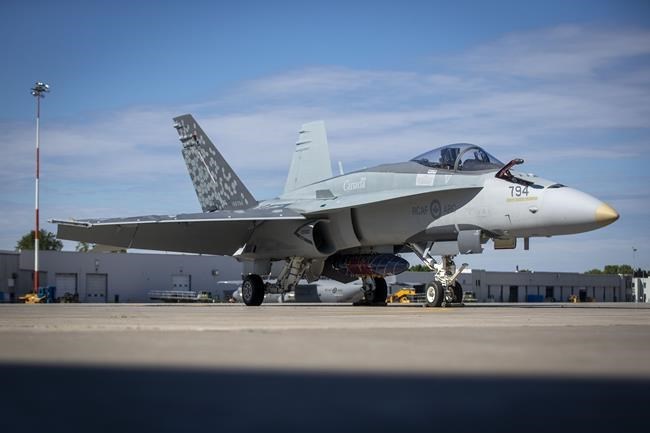OTTAWA — The Royal Canadian Air Force announced on Tuesday that it would reinstate two officers recently disciplined over a homophobic nickname given to a fighter pilot.
Maj.-Gen. Iain Huddleston, commander of 1 Canadian Air Division in Winnipeg, shared the news about Col. Colin Marks and Lt.-Col. Casey Mask in a message to Air Force members.
The two officers pleaded guilty at a hearing last week and were fined several days' pay for not intervening when a group of fighter pilots assigned a highly inappropriate call sign to another aviator during a social gathering in June.
In his message, Huddleston said Mask and Marks "have each demonstrated humility and invested themselves in efforts that have, and will, continue to positively contribute to cultural evolution of the RCAF and CAF."
Those affected by the call sign were supportive of the two officers returning to leadership positions, he added, while expressing "confidence in the ability of Lt.-Col. Mask and Col. Marks to learn from these events."
The announcement clears the way for Marks to assume command of Canada's fighter base at 3 Wing Bagotville, Que., which had been put on hold after a military police investigation into the June 22 gathering that led to the call sign.
Mask will return to his post as commander of a CF-18 squadron at Canada's other fighter base, 4 Wing Cold Lake, Alta.
Lori Buchart, the co-chair of It's Not Just 20K, a support and advocacy group created by victims of military sexual misconduct, had raised concerns on Monday about the two officers being reinstated without some type of concrete action to atone for their decision not to intervene.
Buchart suggested Marks and Mask be required to connect with Armed Forces members who have experienced sexual trauma while in uniform to better understand how their failure to act hurt others.
Air Force spokesman Maj. Trevor Reid said Tuesday that Huddleston has suggested to Marks and Mask that they do that, as well as military LGBTQ Pride groups in the new year.
Reid could not confirm whether such engagements would happen.
In an interview with The Canadian Press last week, Huddleston said he was at a loss for how a roomful of fighter pilots would assign such a name at a time when military members are supposed to have been warned about inappropriate sexual behaviour.
He also couldn't say why Marks and Mask, who were the senior officers in the room, didn't intervene when they heard what was happening.
However, Huddleston said both officers had accepted responsibility and worked to understand the harm that was caused by their failure to act. That includes a "mentorship" to ensure they learn from their mistake.
That mentorship, which Huddleston referred to in his message Tuesday, involves discussions about leadership and reviews of the military's orders on sexual misconduct.
"They will each be afforded an opportunity to continue to implement the lessons they have learned over the course of the past four months of mentorship and discussion with myself and others," he said.
"They are committed to working hard to rebuild and foster trust, psychological safety and inclusiveness within their respective teams and the Canadian Armed Forces."
The fact Marks and Mask have been punished and will go through a process of reintegration is a "progressive step towards correcting harmful behaviours," said Charlotte Duval-Lantoine, an expert on military sexual misconduct at the Canadian Global Affairs Institute.
"I do also find the involvement of the affected persons in the process to be effective," she added.
But it will be important to ensure the process for reintegrating the two officers is not a "check-the-box exercise," Duval-Lantoine said, and for the military to better understand why the incident arose in the first place — and why Marks and Mask didn’t act.
"This incident hides something more insidious and more complex to address: the fact that senior leaders do not always intervene when facing inappropriate behaviours and conduct — there are informal dynamics at play that training cannot necessarily fix," she said.
"This is a problem that is not unique to call sign review boards. It is actually the reason why we see sexual misconduct, discrimination, bullying and hazing being so prevalent."
This report by The Canadian Press was first published Dec. 20, 2022.
Lee Berthiaume, The Canadian Press



